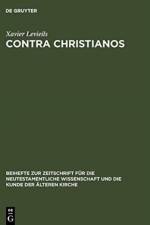- La critique sociale et religieuse du christianisme des origines au concile de Nicee (45-325)
av Xavier Levieils
2 591
The persecution of the Church ordered by the Roman State, whether it was by local magistrates or on imperial command, was the most visible manifestation of the hostility directed against Christians during the first three centuries of our era. In reality however, this persecution, more virulent in some of its episodes than in others, was merely the crystallisation of the rejection of Christianity already expressed by the population at large. Christianity, spreading rapidly beyond its original Jewish context, was perceived by Graeco-Roman society through the deforming lens of ideas and values entirely foreign to it. For this reason, Christians became the victims of religious and social categorisations which forced them into the margins of society. Christianity's assimilation with superstition (Jewish origins, irrational doctrine, recruitment from the masses, doubtful practices [magic, anthropophagy, ritual murder, sexual debauchery, Christ-worship, cross-worship, sun-worship, ass-worship]) and the accusations against it of atheism (a reaction against its exclusive monotheism) and of 'hatred of mankind' (non-adherence to the common values [civil, familial or political]) reveal that public opinion played a crucial role preceding the measures taken against Christians, and that the anti-Christian hostility was a reactionary movement against a group that threatened the basic structures of the City.

